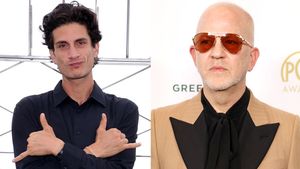The Human Rights
Campaign marked a first in its history this month when
it opened a campaign office in Concord, N.H. -- a central
hub for presidential candidates on the campaign trail.
Though the move
attracted little attention nationally, the ceremony drew
about 100 people, including HRC members, staffers from the
Obama, Edwards, and Clinton campaigns among others,
and key state politicians such as Ray Buckley, the New
Hampshire Democratic Party chair. State senate
president Sylvia Larsen presented an official proclamation
welcoming HRC into the mix.
The organization
has also hired a full-time organizer and political
operative, Heather Gibson, to help coordinate the efforts of
LGBT groups and HRC members on the ground in New
Hampshire.
National field
director Marty Rouse said the move is part of a protracted
campaign by HRC to have a presence in key states where the
group can have an impact both locally and nationwide.
"We
can't be in all 50 states," said Rouse,
"so our goal has been to look across the
country and see where we can be helpful in moving forward a
GLBT agenda that, while important to the community members
in that one state, also might have national
implications." He estimated that HRC would pour
upward of $50,000 into New Hampshire during the primaries
alone.
The HRC committed
almost $150,000 in the 2006 elections in both New
Hampshire and Iowa in order to elect what Rouse calls
"fair-minded majorities" in both state
legislatures. At the time, officials in both states
were considering putting an antigay constitutional marriage
amendment on the ballot for voters in 2008.
But HRC's
strategy along with other forces contributed to Democrats
gaining majorities in both legislative bodies in New
Hampshire and Iowa. Consequently, instead of debating
marriage amendments this year, elected officials in
both states introduced and passed pro-LGBT legislation: a
civil unions bill in New Hampshire and a civil rights bill
that protects gays against discrimination in Iowa.
"Think how
different it is when Hillary Clinton speaks in front of the
Manchester Democrats and says, 'I congratulate you
all and your governor for having civil unions in New
Hampshire,'" said Rouse. "Think about
that versus having marriage amendments -- would [the
Democrats] be courting our community openly if we were
fighting marriage amendments in Iowa and New
Hampshire?"
HRC has also been
actively working in Iowa with One Iowa, the
state's LGBT civil rights organization. In June they
launched a campaign there to highlight the
military contributions of LGBT soldiers called
the Legacy of Service Tour, which received press
coverage by most of the state's local TV affiliates, the
Des Moines Register, and the Associated
Press.
HRC also
corralled 50 volunteers on September 16 to the 30th annual
Harkin Steak Fry -- Iowa's compulsory event for
Democratic presidential candidates.
"Every
single presidential campaign saw us and we have pictures of
them holding up our T-shirts," said Rouse.
"What we're trying to do is increase the
LGBT visibility in these campaigns so the candidates know
that they need to address our issues."
Rouse encourages
LGBT voters to attend as many house parties as possible
in Iowa and New Hampshire and ask questions, regardless of
whom one anticipates voting for come the primary.
"We're trying to lift all boats
here," he said.
HRC is conducting
training sessions for caucusgoers in both Iowa and
Nevada because the public nature of attending caucuses can
be intimidating to first-timers.
Whereas at a
primary such as in New Hampshire, voters go into a booth and
vote behind a curtain for a presidential candidate, Rouse
explained, "at a Caucus, you're public
-- you have to publicly declare in a public place
which candidate you support in front of all your peers --
that's not something people like to do."
Then if the candidate one chooses is left with too few
votes, one has to pick another candidate on the fly even as
they are actively courted by other campaigns.
"It's a very intense process,"
said Rouse. (Kerry Eleveld, The Advocate)














































































